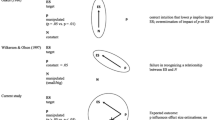Abstract
A formal theory of appropriateness for statistical operations is presented which incorporates features of Stevens' theory of appropriate statistics and Suppes' theory of empirical meaningfulness. It is proposed that a statistic be regarded as appropriate relative to statements made about it in case the truths of these statements are invariant under permissible transformations of the measurement scale. It is argued that the use of inappropriate statistics leads to the formulation of statements which are either semantically meaning-less or empirically nonsignificant.
Similar content being viewed by others
References
Adams, E. W., Fagot, R. F., and Robinson, R. E. Invariance, meaningfulness, and appropriate statistics. Tech. Rep. No. 1, Measurement Theory Reports, Univ. of Oregon, August 1, 1964.
Anderson, N. H. Scales and statistics: Parametric and nonparametric.Psychol. Bull., 1961,58, 305–316.
Behan, F. L. and Behan, R. A. Football numbers (continued).Amer. Psychologist, 1954,9, 262–263.
Burke, C. J. Additive scales and statistics.Psychol. Rev., 1953,60, 73–75.
Campbell, N. R.An account of the principles of measurement and calculation. London: Longmans, Green, 1928.
Campbell, N. R. Measurement and its importance for philosophy.Aristotelian Society Supplementary Volume, 1938,17, 121–142.
Campbell, N. R.Physics: the elements. Cambridge Univ. Press, 1920. Republished asFoundations of Science, New York: Dover, 1957.
Comrey, A. L. Mental testing and the logic of measurement.Educ. psychol. Measmt, 1951,11, 323–334.
Lord, F. M. On the statistical treatment of football numbers.Amer. Psychologist, 1953,8, 750–751.
Luce, R. D. On the possible psychophysical laws.Psychol. Rev., 1959,66, 81–95.
McConnell, A. J.Applications of the absolute differential calculus. London: Blackie and Son, 1931.
Robinson, R. E. A set-theoretical approach to empirical meaningfulness of measurement statements. Tech. Rep. No. 55, Institute for mathematical studies in the social sciences, Stanford Univ., June 10, 1963.
Senders, V. L. A comment on Burke's additive scales and statistics.Psychol. Rev., 1953,60, 423–424.
Siegel, S.Nonparametric statistics. New York: McGraw-Hill, 1956.
Stevens, S. S. On the theory of scales of measurement.Science, 1946,103, 667–680.
Stevens, S. S. Mathematics, measurement, and psychophysics. In S. S. Stevens (Ed.),Handbook of experimental psychology. New York: Wiley, 1951.
Stevens, S. S. Measurement, psychophysics, and utility. In C. W. Churchman and P. Ratoosh (Eds.),Measurement: definitions and theories. New York: Wiley, 1959.
Suppes, P. A set of independent axioms for extensive quantities.Portugaliae mathematica, 1951,10, 163–172.
Suppes, P. Measurement, empirical meaningfulness, and three-valued logic. In C. W. Churchman and P. Ratoosh (Eds.),Measurement: definitions and theories. New York: Wiley, 1959.
Suppes, P. and Zinnes, J. L. Basic measurement theory. In R. D. Luce, R. R. Bush, and E. Galanter (Eds.),Handbook of mathematical psychology, Vol. 1. New York: Wiley, 1963.
Tarski, A. Some methodological investigations on the definability of concepts. InLogic, semantics, metamathematics. New York: Oxford Univ. Press, 1956, 296–319.
Author information
Authors and Affiliations
Additional information
This research was supported in part by each of the following grants: National Science Foundation Grant GS-333 to the University of Oregon; National Science Foundation Grant to the Institute of Human Learning, University of California, Berkeley; and National Institute of Mental Health Grant MH-08055-01 (under the direction of Ernest W. Adams), also to the Institute of Human Learning. Work on this project was carried out in part during Robert F. Fagot's tenure as Public Health Service Special Fellow (No. MSP-15800) at the University of California, Berkeley, 1962-63; and during Richard E. Robinson's tenure as National Science Foundation Science Faculty Fellow at Stanford University, 1962–63.
Rights and permissions
About this article
Cite this article
Adams, E.W., Fagot, R.F. & Robinson, R.E. A theory of appropriate statistics. Psychometrika 30, 99–127 (1965). https://doi.org/10.1007/BF02289443
Received:
Issue Date:
DOI: https://doi.org/10.1007/BF02289443




